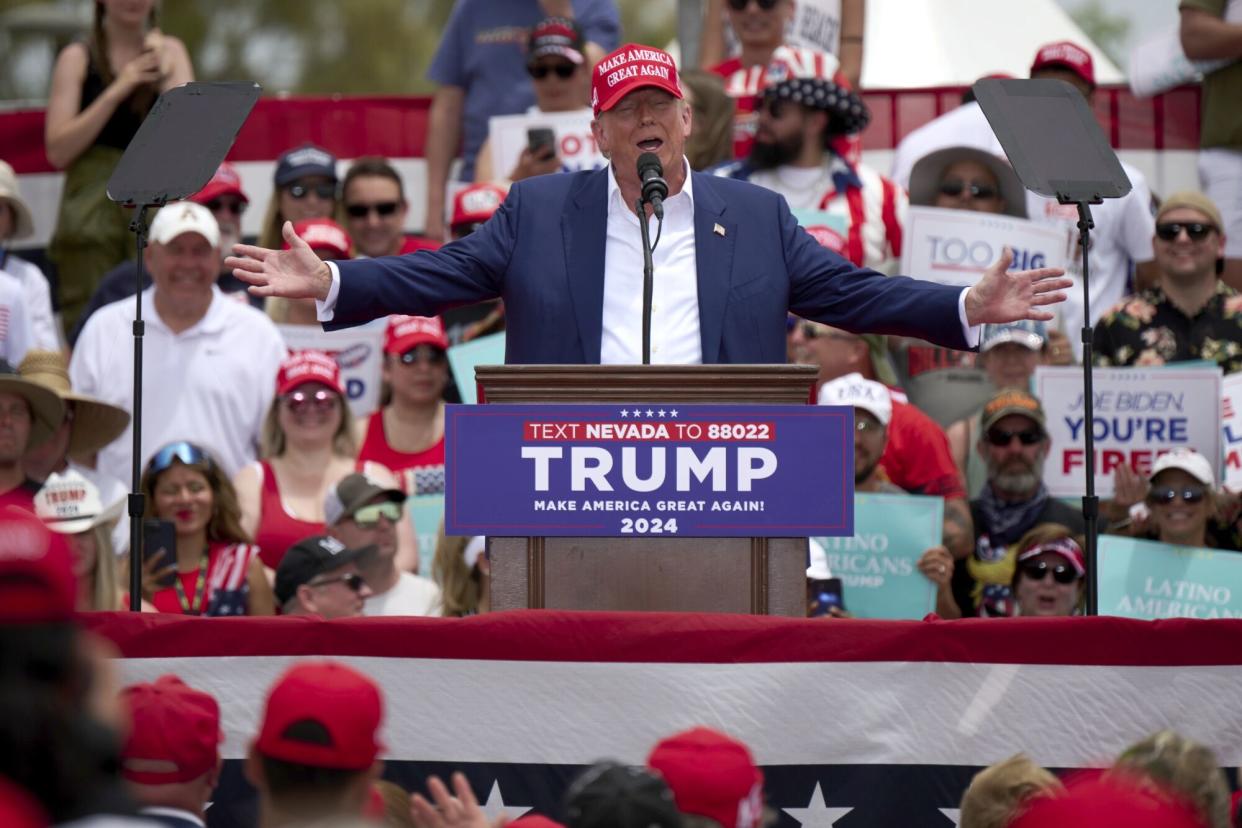Trump Vows to End Taxes on Tips in Bid to Woo Restaurant Workers

(Bloomberg) -- Donald Trump’s out-of-left-field proposal to eliminate taxes on tipped income for hospitality workers is his latest attempt to appeal to younger voters and people of color.
Most Read from Bloomberg
Dozens of CVS Generic Drug Recalls Expose Link to Tainted Factories
Stocks Rise as Solid Treasury Sale Spurs CPI Bets: Markets Wrap
The idea — tucked into an hour-long campaign rally in Las Vegas on Sunday alongside complaints about immigrants and electric vehicles — is one of the few specific tax plans Trump has outlined during the campaign, as Congress prepares for negotiations next year when key portions of his 2017 tax overhaul are set to expire.
“This is more campaign politics than it is serious tax policy,” said Erica York of the Tax Foundation, a right-leaning think tank. “The question on the tax policy front should be what are you going to do about the expirations of 2017 tax law coming next year, not what random tax policy proposal can you throw out on the campaign trail.”
Trump has pledged to renew the $4.6 trillion of expiring tax cuts on individual incomes, small businesses and inheritances next year. But Republicans have yet to build consensus around other tax ideas — or how to pay for them — if they have control of the White House and Congress.
Exempting tipped wages from federal levies has the potential to trim the tax bills of the more than six million hospitality workers who reported a total of $38.3 billion in tipped income in 2018, the latest year for which Internal Revenue Service data are available. That averages out to about $6,250 per tipped worker.
The plan is also rife with unintended consequences that could give incentives to workers and employers to shift more compensation from wages to tips and could potentially block some low-income households from tax benefits like the child tax credit.
Announcing the proposal in Las Vegas was not a coincidence: Nevada, with casinos that draw millions of tourists a year, has the highest proportion of food service and accommodations workers in the country, an industry whose employees have historically relied on tips.
“For those hotel workers and people that get tips, you’re going to be very happy,” Trump told the Las Vegas crowd. “Because when I get to office, we are going to not charge taxes on people making tips.”
Unionized casino workers have traditionally been a rich source of Democratic votes in Nevada, whose six electoral votes could decide the presidential election. The Culinary Union dismissed the Trump proposal, which came at his first rally since being found guilty of paying hush money to an adult film actress before the 2016 election, as “wild campaign promises from a convicted felon.”
Exempting tips from taxes would benefit largely lower-income workers, unlike the expiring tax cut law which has been criticized for concentrating reductions for the highest earners.
“It makes the tax code a little more progressive because the people who are receiving tips are disproportionately at the lowest income levels,” said EJ Antoni of the conservative Heritage Foundation.
Tipped Workers
The tips reported to the IRS are likely much less than what tipped workers actually earned. Collecting taxes on that income has been such a challenge that the IRS has agreements with major casinos and restaurants to automatically report and withhold taxes based on past averages of tipped income.
Trump’s proposal would go against the grain of recent tax policy, which has emphasized broadening the base of income subject to taxes while also lowering the rates. By carving out tipped income from taxes, Trump would have to increase overall rates in order to bring in the same amount of income, essentially shifting the tax burden from tipped employees to salaried ones.
Given that many tipped employees are low-income workers who benefit from tax credits that are based their earnings, it’s possible that failing to claim tips as income could cost them the earned income tax credit or the child tax credit, said Marc Goldwein of the Committee for a Responsible Federal Budget.
Fuzzy Math
It’s unclear whether or how Trump’s proposal, if enacted, would apply to Social Security and Medicare taxes — which would make the budgetary impact bigger and potentially leave millions of workers with smaller benefits in retirement.
“All those things matter, so I don’t have a tax model to tell you exactly how much this is going to cost,” Goldwein said.
The Trump campaign did not respond to requests for more details of the proposal.
The former president said he would make the change “right away, first thing in office.” But such a tax change would require congressional approval.
He claimed credit for coming up with the idea — “it’s the first time anyone has brought it up,” he said — but it mirrors a proposal that Wisconsin State Senator Andre Jacque, a Republican, has made in his state.
“I think the idea is basically if we’re looking for ways to make the tax code fairer and help the service industry rebound, this is something that has bipartisan support,” Jacque said in an interview. His proposal earned support of 14 Republicans and five Democrats but was opposed by Democratic Governor Tony Evers, who has instead pushed for an increase in the minimum wage for tipped workers.
--With assistance from Augusta Saraiva.
Most Read from Bloomberg Businessweek
China’s Economic Powerhouse Is Feeling the Brunt of Its Slowdown
As Banking Moves Online, Branch Design Takes Cues From Starbucks
Food Companies Hope You Won’t Notice Shortages Are Raising Prices
Legacy Airlines Are Thriving With Ultracheap Fares, Crushing Budget Carriers
©2024 Bloomberg L.P.



